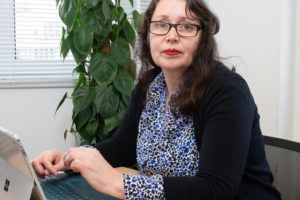The Wellbeing Project, a global initiative focusing on cultures of well-being for social change institutions, visited the Center for Healthy Minds to launch a collaboration to understand well-being in organizational culture.
In this collaboration, Center scientists will work with the Wellbeing Project to quantify the impact of the project's interventions on individuals and organizations. Project Lead Aaron Pereira and Organizational Exploratory Program Co-Lead Alana Cookman from The Wellbeing Project and Principal Consultant/Researcher Dr Sadie King from the Tavistock Institute of Human Relations shared their thoughts on shifting how certain workplaces view health and happiness.
Tell us more about the Wellbeing Project, and what you’re trying to achieve.

Aaron Pereira: The Wellbeing Project is working to catalyze a culture of well-being for all change-makers – anyone in a profession that’s focused on caring or helping. With our organizational well-being work, we aim to help everyone from social entrepreneurs to caregivers to peacekeepers and teachers find ways to incorporate well-being into their organizational culture. When people have their inner needs met, feel supported and have confidence to ask for help in their organizations, they are better able to serve the causes they seek to improve.
What do you see in common working across organizations?

Alana Cookman: Some of the things that come up consistently is that when you develop your inner well-being, lots of things start shifting and changing within a work context too. Collaboration and relationships become easier as people develop more space within themselves and are able to see a wider range of perspectives. It’s easier for people to have more meaningful relationships within the organization and to work with external stakeholders. A culture of openness develops a sense of celebrating the whole person at work, and enabling more compassionate and empathetic relations with colleagues.
Why is well-being so important in social change organizations compared to other types of organizations?
Aaron Pereira: The people working in these sectors believe they need to save the world. They often times do not have a culture of self-care or their own well-being because they are so focused on others. There is always more to do, another person to save. If you’re already carrying stuff inside you where you’re not taking care of yourself, it becomes easy to lose yourself. The rates of burnout, substance abuse, depression and divorce in this sector are very high. When personal well-being becomes a focus, there is a shift in how they are with the people around them and the work they do.
What does a culture of well-being look like, and how does someone know that they’re succeeded in shifting the culture?
Alana Cookman: This spring the Wellbeing Project starts working with eight organizations across the globe in a two-year exploratory and learning program that looks into what a human-centered culture is and how to put well-being at the heart of their culture. This kind of study hasn’t been done in the social change space before. We’re very lucky to be working with a really diverse set of organizations. Organizational well-being is going to mean different things to different people and organizations across different geographies and sub sectors. Defining and measuring well-being presents some challenges across so many cultural diversities, so watch this space with what we learn!

Sadie King: Work life, is one of the most important areas of human activity. This is about developing a workplace where your life doesn’t seem to end when you come into the door. The developmental evaluation of this project embraces the intersection of different approaches to change and evidence, and I think it’s about raising awareness around that too. Our challenge will be to describe how organizational well-being embeds and to measure the impact on workers and the quality of their work.






